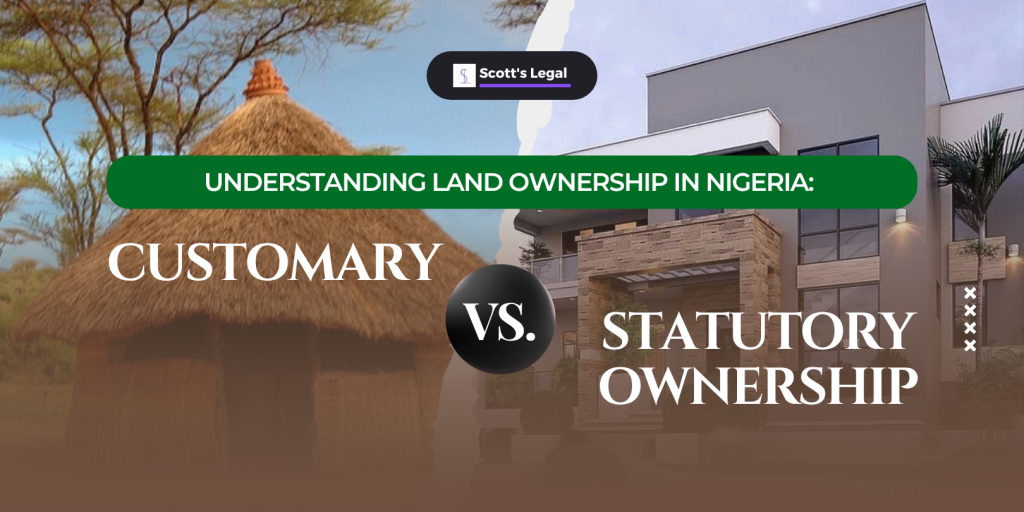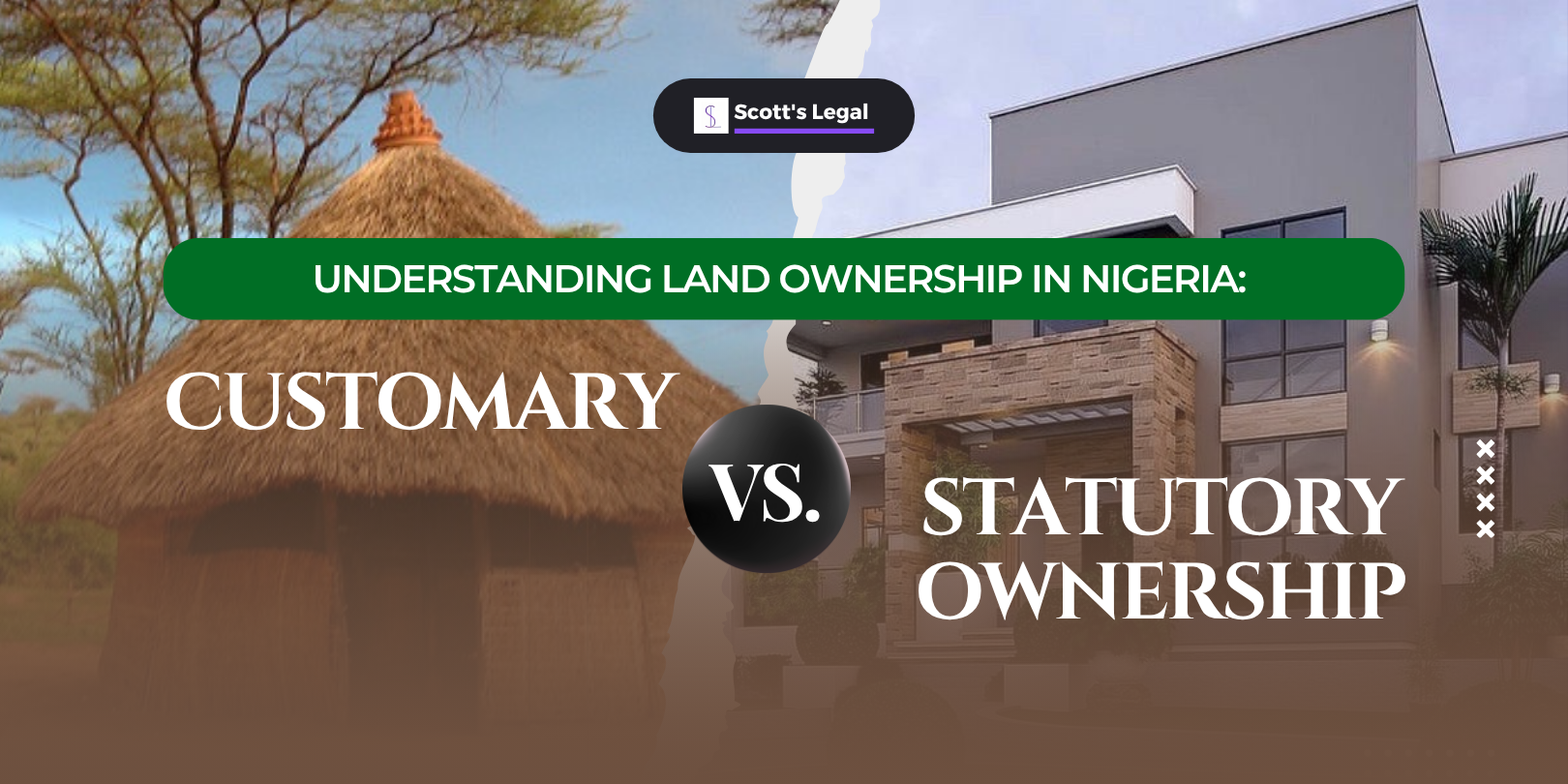Land ownership in Nigeria plays a fundamental role in real estate investment, development, and property law. Therefore, understanding how ownership works, particularly the distinction between customary and statutory rights, is crucial for investors seeking to purchase, develop, or transfer land legally and with confidence.
This guide explains the two main systems of land ownership in Nigeria: The Customary Land Ownership and Statutory Land Ownership.
In this article, we’ll learn about the key features, legal implications, and what real estate investors must know as regards land ownership in Nigeria. Let’s begin.
Overview of Land Tenure System in Nigeria
The land tenure system in Nigeria defines how individuals or communities own, use, and transfer land.
It operates under two major frameworks:
- Customary Land Ownership: This is rooted in traditional laws and community practices.
- Statutory Land Ownership: This is based on the Land Use Act of 1978 and managed by the state government.
Both systems coexist under the land law in Nigeria, but their operation and legal effect differ depending on the location (rural or urban) and the type of land transaction involved.
Right now, we will proceed to examine each of these frameworks under different subheads.

Customary Land Ownership in Nigeria
Customary land rights in Nigeria are among the oldest forms of landholding and are still dominant in rural and semi-urban areas. They exist outside formal government systems, but the Nigerian law legally recognizes them.
Key Features of Customary Ownership
- Communal Ownership:
In communal ownership, families, clans, or entire communities own land. The family head or traditional ruler acts as a trustee, managing the land for the collective benefit of all members.
- Acquisition:
Ownership is usually acquired through inheritance, allocation, gift, or purchase under customary law. Transactions are often oral and based on trust, with limited or no formal documentation.
- Proof of Ownership:
The following establishes proof of ownership under customary law
- Long possession and continuous use of the land.
- Witness testimony from community members.
- Acts of ownership, such as building or farming.
- Community recognition of ownership rights.
- Limitations:
A major restriction is that land cannot be sold or transferred without the consent of the family, community, or traditional authority. Unauthorized sales can render a transaction void.
- Judicial Recognition:
Nigerian courts consistently recognize and enforce customary ownership when proven through credible evidence. In Adole v. Gwar (2008), the court affirmed that customary ownership remains valid unless lawfully extinguished by statutory provisions.
Implications for Real Estate Investors
Investors buying land under customary law must ensure:
- The sale has the consent of all family or community members
- Proper survey and documentation follow immediately after purchase
- The land is not subject to multiple ownership claims.
Converting such land into statutory ownership (by obtaining a Certificate of Occupancy) is often necessary to secure investment value and reduce disputes.
Let’s now proceed to examine the statutory rights when it comes to land ownership in Nigeria.
Statutory Land Ownership in Nigeria
Statutory land ownership is the formal system established under the Land Use Act of 1978, which vests all land in each state in the Governor, to be held in trust for the people. It is most common in urban and developed areas.
Key Features of Statutory Ownership
- Statutory Right of Occupancy:
Individuals, companies, or institutions can acquire land through a Statutory Right of Occupancy granted by the Governor. This extinguishes previous customary rights unless they were vested or recognized by law.
- Documentation and Title Evidence:
The following documents are legally acceptable to establish ownership
- Certificate of Occupancy (C of O)Deed of Assignment
- Governor’s Consent
These documents provide legal proof of ownership and are essential in property sales or transfers.
- Transfer and Consent Requirements:
Under Section 22 of the Land Use Act, any sale, transfer, mortgage, or assignment of land requires the Governor’s consent. Failure to obtain this consent renders the transaction invalid.
- Revocation of Rights:
The Governor may revoke a Statutory Right of Occupancy for public interest, but due process and payment of compensation must follow. This principle was reinforced in CSS Bookshops Ltd v. Registered Trustees of Muslim Community (2006).
Investor Considerations
- Always verify that the title documents are genuine and duly registered.
- Confirm that the Governor’s consent has been granted for any secondary transaction.
- Engage a property lawyer to conduct a proper land search at the Land Registry before purchase.
Comparison Between Customary and Statutory Ownership
| Features | Customary Ownership | Statutory Ownership |
| Legal Basis | Traditional customs and community laws | Land Use Act of 1978 |
| Ownership Holder | Family, clan, or community | State Governor (on behalf of the people) |
| Documentation | Often informal or oral | Formal legal documents (C of O, Deed of Assignment) |
| Transfer Process | Requires family/community consent | Requires Governor’s consent |
| Dominant Areas | Rural and semi-urban | Urban and developed |
| Proof of Ownership | Acts of possession, recognition, and tradition | Registered title documents |
| Dispute Resolution | Handled by customary institutions or courts | Governed by statutory courts and land laws |
Legal Principles Governing Land Ownership
The Nigerian courts have established five main ways to prove ownership of land, as outlined in Idundun v. Okumagba (1976):
- Traditional Evidence (proof of ancestry or inheritance)
- Production of Title Documents (C of O, Deed, etc.)
- Acts of Ownership (development, rent collection, or occupation)
- Long Possession (consistent, undisputed use over time)
- Ownership of Adjacent Land (where the same owner controls neighboring plots)
Furthermore, a Statutory Right of Occupancy supersedes any Customary Right of Occupancy. Once a statutory title is granted over a parcel of land, all existing customary rights are extinguished unless expressly preserved by law (as reaffirmed in Adole v. Gwar).
Conclusion
The land ownership system in Nigeria is a blend of tradition and statutory regulation. While customary land rights in Nigeria preserve cultural heritage and community structure, statutory land ownership ensures legal certainty, documentation, and investor protection.
For real estate investors, understanding these two systems is crucial before acquiring land. Always verify ownership history, ensure compliance with land law in Nigeria, and consult a qualified real estate lawyer to avoid disputes and secure your investment.
Other Articles On The Blog
Navigating property laws in Nigeria can be complex, but the right legal guidance makes all the difference.
At Scotts Legal, we provide expert support in property acquisition, title investigation, registration, and property management, helping real estate investors make confident, compliant, and secure decisions.
For consultations and inquiries, send us a message – here.





